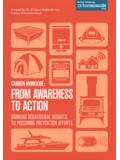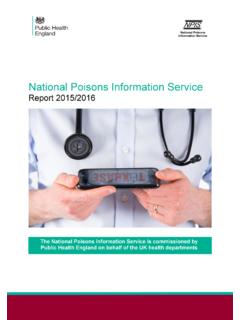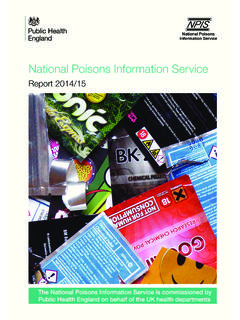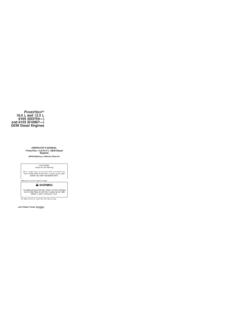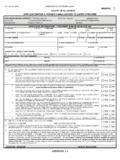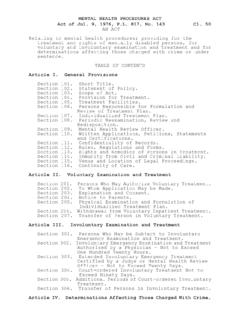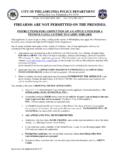Transcription of National Poisons Information Service
1 National Poisons Information Ser viceReport 2013/14 National Poisons Information ServiceThe National Poisons Information Service is commissioned by Public Health England on behalf of the UK health departmentsNational Poisons Information ServiceA Service commissioned by Public Health England on behalf of the UK health departmentsThe main role of the National Poisons Information Service (NPIS) is to advise NHS healthcare professionals on the diagnosis, treatment and care of poisoned patients across the UK. Poisoning is an extremely common cause of hospital admissions in the NHS, being similar in number to admissions for myocardial infarction.
2 NPIS advice ensures that healthcare staff have access to up-to-date Information about treating poisoned patients and that patients without significant poisoning are not treated in hospital, thus reducing unnecessary use of NHS resources. The major workload of NPIS is to advise hospital emergency departments, but minor injuries units and primary care services are also significant users of the Service the latter to a large extent involving NHS telephone helplines (NHS 111, NHS 24 and NHS Direct).NPIS units at 31 March 2014 NPIS Birmingham UnitCity Hospital, Birminghamhosted by Sandwell and West Birmingham Hospitals NHS TrustDirector: Professor J A Vale MD FRCP FRCPE FRCPG FFOM FAACT FBTS FBPharmacolS FEAPCCT Hon FRCPSGNPIS Cardiff UnitLlandough Hospital, Cardiffhosted by Cardiff and Vale University Health BoardDirector: Dr J P Thompson BMedSci MBChB FRCP FBTS FEAPCCTNPIS Edinburgh UnitRoyal Infirmary of Edinburghhosted by NHS Lothian University Hospitals DivisionDirector.
3 Professor M Eddleston MA PhD FRCPE FEAPCCTNPIS Newcastle UnitRegional Drug and Therapeutics Centre, Newcastlehosted by Newcastle upon Tyne Hospitals NHS Foundation TrustDirector: Professor S H L Thomas BSc MD FRCP FRCPEE ditorsMs L Gordon BADr G Jackson BSc DipMedTox PhDProfessor M Eddleston MA PhD FRCPE FEAPCCTNPIS Edinburgh Unit, on behalf of the NPISWe are grateful for the support and help of all our NPIS and PHE colleagues in the production of this reportPHE gateway number: 2014344O ctob e r 2014 ISBN 978-0-85951-761-4 Crown copyright 2014 Front cover Reed diffusers Reckitt Benckiser and electronic cigarettes John Thompson, NPIS Cardiff1 Foreword Poisoning or suspected poisoning, encompassing drug overdose, recreational drug toxicity, accidental poisoning and occupational or environmental exposures, continues to be an important public health issue in the UK.
4 Challenges for the NHS include the large numbers of patients presenting each year, the diversity of substances that may be involved and the absence of clinicians with specific expertise in the management of poisoning in most UK marked the 50th anniversary of the National Poisons Information Service (NPIS) and the support that it provides to NHS professionals in managing patients with suspected poisoning. This has been achieved by the provision of evidence-based Information and management advice on a 24 hours a day basis, delivered by telephone and through the NPIS online database, TOXBASE.
5 The availability of accurate Poisons Information is highly cost effective as it substantially reduces unnecessary hospital referrals and admissions for patients at low risk of clinical toxicity and optimises treatment and shortens hospital stay for those at risk of, or with features of, NPIS is commissioned by Public Health England on behalf of all four UK departments of health and by Beaumont Hospital, Dublin, on behalf of the government of the Republic of Ireland. This report is a formal statement of NPIS activity, accountability and governance for 2013/14. The Information provided demonstrates the increasing use of the Service by the NHS, the exceptional value that users place on the Service as evidenced by their feedback and the value of data collected for public health surveillance purposes.
6 This performance has been achieved in spite of funding pressures which affect the NPIS as they do other services provided or commissioned by Public Health England. Maintaining the volume and quality of services in the face of further restrictions on budgets and staff numbers will be a key challenge for the immediate Thomas Chair, NPIS Clinical Standards GroupRaquel Duarte-Davidson Centre for Radiation, Chemical and Environmental Hazards Public Health EnglandJill Meara Centre for Radiation, Chemical and Environmental Hazards Public Health England 2 NPIS Report 2013/14 ContentsForeword 1 Contents 2 Executive Summary 31 Introduction 52 Structure of the National Poisons Information Service 73 NPIS Activities in 2013/14 Overall Service Profile Consultant Referrals NPIS Product Data Centre NPIS Literature Database and Current Awareness in Clinical Toxicology NPIS Website TOXBASE App for Smart Phones TOXlearning A Clinical Toxicology E-learning Resource 194 UKTIS Activities in 2013/14 Overview of the Service Service Development New
7 Public Facing Website Surveillance and Research 245 Clinical Governance Analysis of Critical Events Quality Assurance Exercises Training and Continuing Professional Development 306 Areas of Interest in 2013/14 Drugs of Misuse Paracetamol Urgent Alerting 2,4-dinitrophenol Radiation Pesticides Reed Diffusers Electronic Cigarettes 477 Conclusions 508 Recommendations 51 Outcome of Recommendations for 2013/14 51 Recommendations for 2014/15 51 APPENDIX A Senior NPIS Staff 52 APPENDIX B NPIS Publications in 2013/14 583 Executive SummaryBackgroundThe National Poisons Information Service (NPIS) is commissioned to provide Information and advice for NHS health professionals to support the management of patients with suspected poisoning.
8 This is a common presentation, involving approximately 140,000 people who are admitted to UK hospitals each year. Many more are discharged from emergency departments or managed in primary care, including by NHS advice services such as NHS 111, NHS 24 and NHS NPIS provides Information and evidence-based management advice about individual substances through its online database, TOXBASE *, backed up by its telephone advice Service 24 hours a day, staffed by Information scientists and further supported by a rota of consultant clinical toxicologists. The availability of this expertise avoids unnecessary hospital referrals and admissions for patients at low risk of clinical toxicity, while improving quality of treatment and shortening hospital stay for those with clinical NPIS also incorporates the UK Teratology Information Service (UKTIS)
9 , the National source of Information and advice about exposures to drugs and chemicals during educational sessions and those from the NPIS and associated Poisons centres, there were 576,000 TOXBASE user sessions and around 1,527,000 separate product accesses during 2013/14, increases of and , respectively, on equivalent figures for the previous year. The most frequent users were hospital departments (66%) and NHS 111, NHS 24 and NHS Direct staff (22%).The total number of telephone enquiries during 2013/14 was around 56,000, an increase of over the previous year, with NHS 111, NHS 24 and NHS Direct (34%), hospitals (28%) and primary care (24%) the most frequent users.
10 Over 2,300 enquiries were referred to NPIS consultants, an increase of around 5% over 2012/13, of which 89% came from hospital staff.* TOXBASE is a registered trademark of the UK National Poisons Information ServiceThe telephone enquiries include nearly 2,900 exposures to drugs and chemicals during pregnancy referred to UKTIS. This is a similar number to the previous year, but the number of downloads of detailed pregnancy Information from TOXBASE has increased by 12% to 64,500 and UKTIS monograph summary downloads increased by 50% to 122,000 compared with 2012/13. During the year UKTIS developed its public facing website bumps best use of medicines in pregnancy ( ) and prepared 25 Information leaflets covering around 40 exposures for the launch of the website at the beginning of April is essential to update the approximately 17,000 product entries in TOXBASE regularly.

